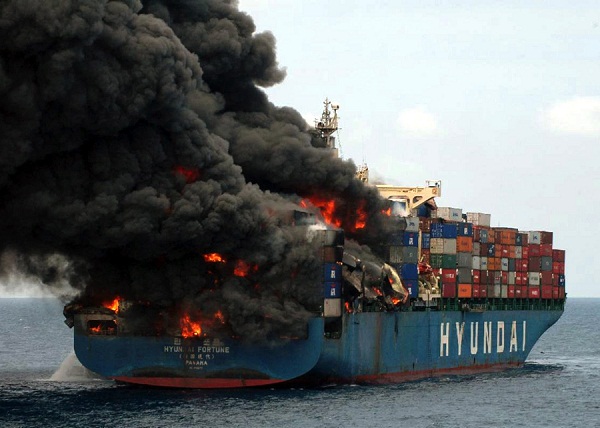Maritime Insurers Unite: A Comprehensive Initiative To Reduce Cargo Fires

7 September 2023
Overview: Maritime Insurers unite (Cargo Fires)
Major maritime insurers unite to address the ongoing problem of cargo fires at sea, marking a significant step towards improving safety in the worldwide shipping industry. This joint effort aims to safeguard the lives of seafarers, protect the environment, and reduce the hazards involved in shipping commodities across the world’s oceans.
A Growing Concern: Cargo Fires at Sea
The maritime industry has long been concerned about cargo fires aboard ships, and that issue is getting worse. The safety of the crew, the vessels, and the environment are seriously threatened by these fires. The results could be disastrous, including the loss of life, severe ship damage, and environmental catastrophes.
It has become harder to avoid and efficiently fight these fires due to the complexity of modern supply lines and the variety of cargo being transported.Hazardous goods, incorrect stowage, and insufficient onboard fire prevention measures are common causes of cargo fires.
A Collaborative Approach
Major maritime insurers have joined forces to create a consortium with the goal of decreasing cargo fires after seeing the necessity for a coordinated response to this urgent issue.Some of the most well-known businesses in the sector are represented in the consortium, which is combining its resources and knowledge to create complete plans and solutions.
Key Objectives and Initiatives : The primary objectives of this consortium are:
- Risk Assessment and Management: The consortium will conduct extensive research and risk assessments to identify the root causes and factors contributing to cargo fires. By understanding these risks better, insurers can work with shipping companies to develop more effective risk mitigation strategies.
- Improved Training and Awareness: Crew training is a critical factor in preventing and responding to cargo fires. The consortium plans to develop and promote standardized training programs for seafarers, ensuring that they are well-prepared to handle emergencies effectively.
- Best Practices and Guidelines: The consortium will work to establish best practices and guidelines for cargo stowage, storage, and transportation. These guidelines will help shipping companies reduce the risk of cargo fires during transit.
- Technological Solutions: Embracing innovative technologies, such as fire detection and suppression systems, will be a key focus. The consortium will explore and promote the adoption of advanced systems that can quickly detect and extinguish fires before they escalate.
- Data Sharing: The sharing of data on cargo fires, near-miss incidents, and successful prevention measures will be encouraged within the industry. This collective knowledge will enable shipping companies to learn from past experiences and continuously improve safety measures.

The Significance of Insurance Industry Involvement : The participation of major insurers in this initiative is pivotal for several reasons:
- Financial Backing: Insurers bring significant financial resources to the table, allowing for the implementation of large-scale projects and initiatives aimed at preventing cargo fires.
- Actuarial Expertise: Insurers have extensive experience in assessing risks and developing models to predict and prevent losses. This expertise can be applied to cargo fire prevention effectively.
- Risk Mitigation: By working closely with their clients, the shipping companies, insurers can actively contribute to reducing the risk of cargo fires through better underwriting practices and safety requirements.
- Claims Management: Insurers are intimately involved in the aftermath of cargo fires, as they handle claims resulting from such incidents. Their participation in this initiative signifies a commitment to reducing such claims through proactive prevention measures.
Industry Reactions and Support
Numerous stakeholders in the maritime industry have expressed strong support for the consortium’s announcement.Port administrations, industry organisations, and shipping corporations have all stated their support for this joint venture.
While admitting the difficulties ahead, shipping corporations have supported the initiative.Many people have already started talking with the consortium to figure out how they can help with the effort to prevent cargo fires.
Environmental Impact
Cargo fire effects on the environment are frequently disregarded. Injurious chemicals and contaminants can be released into the water when items catch fire at sea.Delicate ecosystems may be harmed, and marine life may be destroyed.This project helps to save our oceans and marine wildlife by lowering the frequency of cargo fires.
Conclusion
A important step has been taken toward improving safety, defending the environment, and saving the lives of seafarers with the formation of this coalition of significant maritime insurers to address the ongoing problem of cargo fires at sea. These insurers stand to significantly impact the maritime sector by combining their knowledge and resources. It is hoped that as they make progress toward their goals of risk assessment, enhanced training, best practices, technology advancements, and data sharing, cargo fires would lessen in frequency and instead become an uncommon hazard in international shipping. This program demonstrates the industry’s dedication to on-going development and maritime safety.
Click here to join our Telegram chanel
You will get information, news, and support related to Merchant Navy.
